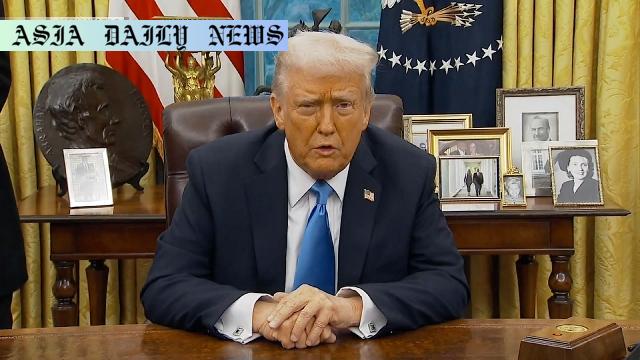Ceasefire: US President Trump emphasized the need for an agreement between Israel and Hamas while Israeli strikes continue.
Ceasefire urged by President Trump amidst rising tensions.
Israeli attacks escalate amid Gaza hostage talks.
Death toll reaches over 56,500 since October 2023.

Trump Advocates for Ceasefire Amid Intensified Gaza Crisis
US President Donald Trump has called for a ceasefire between Israel and Hamas amidst ongoing military escalations in the Gaza Strip. Through social media on Sunday, the President made a direct appeal to both parties, emphasizing the urgency of striking a ceasefire agreement. “MAKE THE DEAL IN GAZA. GET THE HOSTAGES BACK!!!” he tweeted. His public statements underscore his belief that such a resolution could be achieved in a matter of days. However, the challenges to brokering peace remain significant due to the stark disparity in the demands of both sides.
President Trump’s comments have ignited conversations globally, drawing both support and critique for his approach to the matter. While pushing for peace, the US leader also stressed the need for the safe return of hostages, many of whom have been caught in the crossfire of one of the most severe escalations in recent history. Arab media reports suggest that talks are set to resume in Egypt or Qatar, both of which have traditionally played roles in mediating conflicts in the region.
Intensification of Israeli Military Actions
The Israeli military has significantly broadened its operations against Hamas, with reports of intensified airstrikes targeting northern parts of Gaza. On Sunday, the Israeli government unilaterally ordered residents to evacuate, declaring the need for expanded military maneuvers in the days ahead. Such measures have been accompanied by a troubling rise in casualties, with Palestinian medical sources reporting that 21 people were killed on Sunday alone, adding to the broader death toll.
Since October 7, 2023, the devastation in Gaza has grown exponentially, with health officials in the embattled enclave confirming over 56,500 deaths. The civilian toll continues to climb as relentless bombings target infrastructure, residential buildings, and other critical areas. Analysts are pointing to the humanitarian consequences of this enduring conflict, including shortages of food, water, and medical supplies needed to treat the injured.
The Role of Mediating Nations: Egypt and Qatar
Egypt and Qatar, traditional mediators in this contentious conflict, are expected to play a central role in resuming ceasefire negotiations. While both nations remain diplomatically positioned to host these discussions, significant ideological and logistical hurdles must be addressed. Hamas, which governs Gaza, has specific conditions such as lifting the blockade imposed by Israel, while Israel strongly opposes such demands, emphasizing its security concerns. Resolving these core differences is essential to forging even a temporary peace in the near future.
Additionally, the international community, from the United Nations to humanitarian organizations, is calling for an immediate cessation of hostilities. Many stakeholders hope that Egypt and Qatar can leverage their geopolitical influence to urge both Hamas and Israel to prioritize civilian welfare during this crisis.
Humanitarian Toll of Continued Hostilities
The humanitarian crisis in Gaza continues to spiral out of control as military operations persist. Families are being displaced, critical infrastructure destroyed, and essential services disrupted, leaving millions in dire conditions. Medical facilities are overwhelmed by the sheer volume of casualties, with resources rapidly depleting. According to reports, the rising number of children affected by the hostilities paints a particularly grim picture, as families struggle to find solace amid the chaos.
Calls for financial and logistical aid for the region have grown louder on the international stage. Furthermore, relief organizations have flagged the importance of enabling unhindered operations to deliver essential supplies to Gaza’s blocked territories. The absence of immediate moral and humanitarian interventions threatens to compound an already precarious situation.



Commentary
The Complexity of the Gaza Conflict
The ongoing conflict between Israel and Hamas is fraught with decades of history, political tensions, and human suffering, making resolutions elusive. President Trump’s call for a ceasefire represents the latest in a long line of international appeals urging calm and negotiation, but this time, the stakes appear even higher given the catastrophic toll of the recent violence. The sheer numbers—56,500 lives lost since October 7, 2023—are not just statistics. They signify the collective grief of families affected by this brutal conflict.
As Israel intensifies its military actions in Gaza, the need for peace becomes not only a moral imperative but a global necessity. The pain inflicted on civilians, especially children, further emphasizes the urgency of immediate intervention to halt the bloodshed. Yet, achieving a ceasefire between two fundamentally divergent parties remains a significant challenge that demands coordinated international effort.
The Role of Mediation and International Pressure
Countries like Egypt and Qatar play instrumental roles in paving the way for peace by mediating negotiations, but their success depends largely on the willingness of the conflicting sides to make concessions. The complexity of the conflict extends beyond territorial disputes; it is deeply rooted in historical grievances and mistrust. Mediators must perform a delicate balancing act, ensuring both parties feel heard while pushing for actionable compromises.
Furthermore, the international community has a responsibility to apply pressure where it counts. Sanctions and appeals from key players like the United Nations can offer the much-needed momentum for discussions. It is time for world leaders to unite in prioritizing diplomacy over division and work toward lasting peace.
A Humanitarian Perspective
What makes the Gaza conflict even more harrowing is the suffering of innocent civilians trapped in war zones. Access to water, basic hygiene, and emergency medical care is often unavailable during escalations. The images of families fleeing for survival, many without food or shelter, are stark reminders of the human cost of war.
While political negotiations may take time, immediate steps to alleviate civilian suffering must remain a global priority. Grants for humanitarian aid, humanitarian corridors for refugees, and protection of medical units are non-negotiable actions that the international community must enforce. Without addressing this growing crisis, reconciliation and recovery will remain distant dreams.